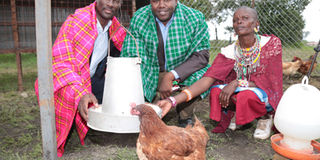Poultry programme boosting Kajiado women pastoralists' livelihoods

Monsanto’s corporate engagement lead, Jimmy Kiberu, Peter Muthee, the director of Latia Resource Centre, and a beneficiary of the poultry programme in Kajiado County. The area's nominated senator, Judith Pareno promised to further support the programme by sponsoring the women with more input to boost their individual poultry projects. PHOTO | BRIAN OKINDA | NMG
What you need to know:
- The programme, which was launched in March this year, targeting to reach 2750 pastoral women in the county, is funded by Monsanto Fund, the charity arm of agriculture technology company, Monsanto.
- The approach reduces the risks involved in self-experimentation and empowers those who have not had access to formal education.
- Lauding the initiative, a nominated senator in the area, Judith Pareno, promised to further support the programme, by sponsoring the women with more input to expedite the running of their individual poultry projects.
- The programme goes a long way in shifting the perception of the larger Maasai community, regarding chicken, so that they are able to see the benefits that come with these easy-to-keep livestock, compared to cattle which they mainly possess.
Up to 1200 women in Orgira location, Kajiado County, are now benefitting from a poultry programme that seeks to improve the livelihoods of pastoral women in the semi-arid county.
The programme, which was launched in March this year, targeting to reach 2750 pastoral women in the county, is funded by Monsanto Fund, the charity arm of agriculture technology company, Monsanto.
It tries to boost the incomes of the women, by affording them an alternative source of livelihood other than the routine, livestock-keeping associated with the communities living in the region.
The project, according to its coordinators, has adopted a “farmer field school” approach, in an innovative system where the women are given training on poultry-keeping, production inputs, and sustainable access to markets for their commodities.
The approach reduces the risks involved in self-experimentation and empowers those who have not had access to formal education.
“Through the project, we hope to build the women’s resilience in the face of the droughts and food insecurity, by affording them an activity whose mechanisms they totally have. This is because in the Maasai culture, larger livestock, such as cattle, sheep, goats and donkeys, among others are usually considered the man’s property, however, poultry exclusively belongs to the woman,” said Peter Muthee, the director of Latia Resource Centre, the establishment through which the programme is being implemented.
Lauding the initiative, a nominated senator in the area, Judith Pareno, promised to further support the programme, by sponsoring the women with more input to expedite the running of their individual poultry projects.
“The programme goes a long way in shifting the perception of the larger Maasai community, regarding chicken, so that they are able to see the benefits that come with these easy-to-keep livestock, compared to cattle which they mainly possess,” said the nominated senator, during a visit to some of the homesteads where the programmes currently run.
“As Maasai pastoralists in Kajiado grapple with the consequences of droughts, rising temperatures, erratic rainfall and other effects of global climate change, it normally is the women and children who bear much of the brunt of these conditions and hence the need to boost the woman’s resilience for come what may,” Monsanto’s corporate engagement lead, Jimmy Kiberu, pointed out.
According to him, the programme will in the long run improve the nutrition of the residents, empower the pastoral community members; especially women, and create alternative livelihoods for the Maasai community living in the county, most of whose womenfolk suffer the consequences of adverse climate conditions.





